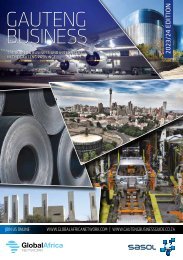South African Business 2017 edition
South African Business is a unique guide to business and investment in South Africa. In addition to an up-to-date economic overview of the country, analyses of the main industrial sectors, plus profiles of the nine provincial economies, the 2017 edition of South African Business includes special features on key topical issues such as skills development and education, renewable energy and the REIPPPP programme, and trade with Africa.
South African Business is a unique guide to business and investment in South Africa. In addition to an up-to-date economic overview of the country, analyses of the main industrial sectors, plus profiles of the nine provincial economies, the 2017 edition of South African Business includes special features on key topical issues such as skills development and education, renewable energy and the REIPPPP programme, and trade with Africa.
You also want an ePaper? Increase the reach of your titles
YUMPU automatically turns print PDFs into web optimized ePapers that Google loves.
OVERVIEW<br />
Agriculture<br />
Agri-processing is a key focus of future investment.<br />
<strong>South</strong> Africa's varied climate and wide range of soils ensure<br />
that it is able to produce a very diverse range of agricultural<br />
products. The country's agricultural exports earn the country<br />
valuable foreign exchange.<br />
Fruit, sugar and wine make up about 7% of the country’s total export<br />
basket. Avocados and tomatoes are among other important export<br />
crops, while the macadamia nut industry is growing exponentially.<br />
More than 50% of agricultural export is made up of processed<br />
agricultural products, a promising development for the future of agriprocessing.<br />
National trade policy strategies are intended to enhance<br />
this trend.<br />
Several of the Special Economic Zones around <strong>South</strong> Africa either<br />
have or will in the future have agri-processing facilities. Examples<br />
include existing tomato paste and dairy facilities at Coega IDZ, as well<br />
as plans to develop the Harrismith SEZ into a hub for agri-processing.<br />
The National Empowerment Fund (NEF) currently spends six percent<br />
of its allocation on agri-processing but intends to increase that.<br />
The focus for the spending of R288-million to date has been on small,<br />
medium and micro enterprises (SMMEs) and the NEF is just one state<br />
entity that has this focus. Several others are similarly engaged, for example,<br />
the Free State provincial government is rolling out a plan to create<br />
agri-parks to provide trading facilities, access to markets and training.<br />
The Free State Department of Agriculture and Rural Development<br />
(DARD) has highlighted the fact that only 11% of the province’s<br />
SECTOR INSIGHT<br />
The NEF intends to increase<br />
the proportion of its budget<br />
spend on agri-processing<br />
projects.<br />
primary agricultural production<br />
is processed within the province.<br />
A severe long-term drought<br />
had a big impact on <strong>South</strong> <strong>African</strong><br />
agriculture. Good rains only came<br />
in July 2016, by which time the<br />
country had to import yellow and<br />
white maize (8.3-million tons in<br />
total) for the first time in more<br />
than a decade. The potato price<br />
doubled in 2016. The average<br />
10kg pocket cost R28.45 in 2015,<br />
R63.30 in March 2016.<br />
The Industrial Development<br />
Corporation (IDC) put up R400-<br />
million to allow the Land Bank to<br />
SOUTH AFRICAN BUSINESS <strong>2017</strong> 50


















